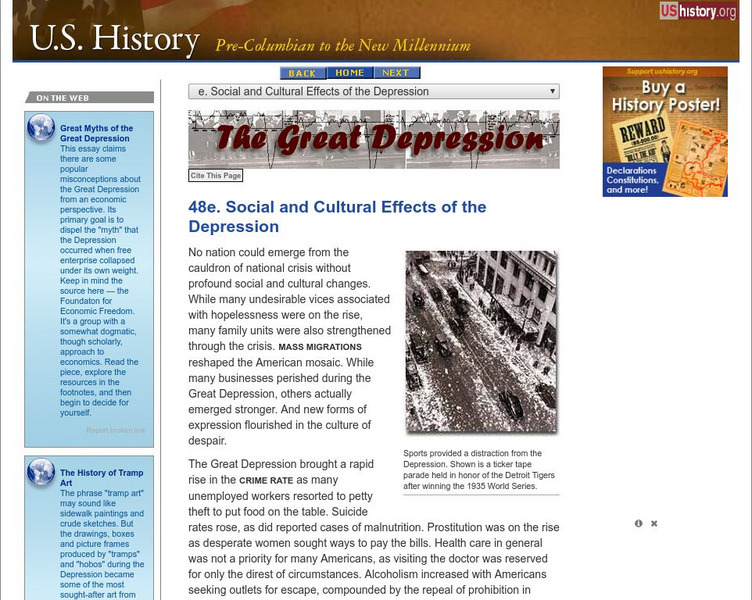Curated OER
Losing Ground
Students examine the Dust Bowl and the effects of farming practices in the early 20th century. They read a handout, and conduct and discuss two experiments simulating soil erosion.
Curated OER
Migrant Workers Through the Lens of Dorothea Lange
Students explore the lives of migrant workers during the Great Depression. In this Great Depression lesson, students examine photographs and song lyrics to gain an understanding of the conditions for people living in the era. Students...
Curated OER
The Great Depression: Eating on a Shoestring
Young scholars explore the realities of feeding a family on a very limited budget by comparing the cost of living in the 1930s to the cost of living today. Using primary documents and technology to make the comparison, they identify the...
Curated OER
Dust Bowl Exodus: How Drought and the Depression Took Their Toll
Students examine the migration of refugees. In this California history lesson, students listen to their instructor present a lecture regarding the details of how the Dust Bowl and Great Depression led to a California population...
Curated OER
Dirty Thirties: The Dust Bowl
Students explore the events and reactions surrounding the Dust Bowl crisis during the 1930's. They discuss how the events of the Great Depression affected America's democracy and how it transformed America.
Curated OER
Out of the Dust
Seventh graders read a book of poems called "Out of the Dust". In groups, they research the Dust Bowl and how it affected people living through the Great Depression. Using the text, they identify the theme and key turning points and...
Curated OER
Dorothea Lange
Students explain that a person's experiences influence their life, write a time line of their life, and analyze Dorothea's photographs and list descriptive words.
Curated OER
Out of the Dust -- Part II
Eighth graders discover that literature can be a great way to gather information about the past. Using various types of text, they research its historical data and determine if it is correct. They write two papers to respond to the...
Other
The Weekly South Dakotan: South Dakota History for 4th Grade
From the very beginning and through the twentieth century, this comprehensive collection of lessons will enrich students studying the history in between and the effects on South Dakota.
PBS
Pbs Learning Media: Organic Farming: Conserving Top Soil
Against the backdrop of the devastating 1930's Dust Bowl, this video segment adapted from Interactive NOVA profiles an organic farmer and the techniques he uses to conserve topsoil.
Writing Fix
Writing Fix: An I Pod Inspired Writing Lesson: The Dust Bowl Blues
The 1930's Dust Bowl era was about the grueling times of people suffering in the drought-stricken region of the Oklahoma pan handle. This instructional activity will help students to gain an understanding of the plights of the people....
Other
The Great Depression
Excellent resource for finding PowerPoint presentations on the Great Depression, New Deal, and FDR to use in your classroom. Also, provides games for students and teacher lesson plans.
HyperHistory Online
Hyperhistory.com: Timelines of the Great Depression
Peruse this timeline of the Great Depression and gather information about this era in United States History. Short, interesting paragraphs summarize U.S. and world events with an emphasis on economic issues.
Independence Hall Association
U.s. History: Social and Cultural Effects of the Depression
Read about how the fabric of the nation was changed during the Great Depression. See how the institutions of life--marriage, birth rates, education, public health--all saw disruption because of the compromised economy.















